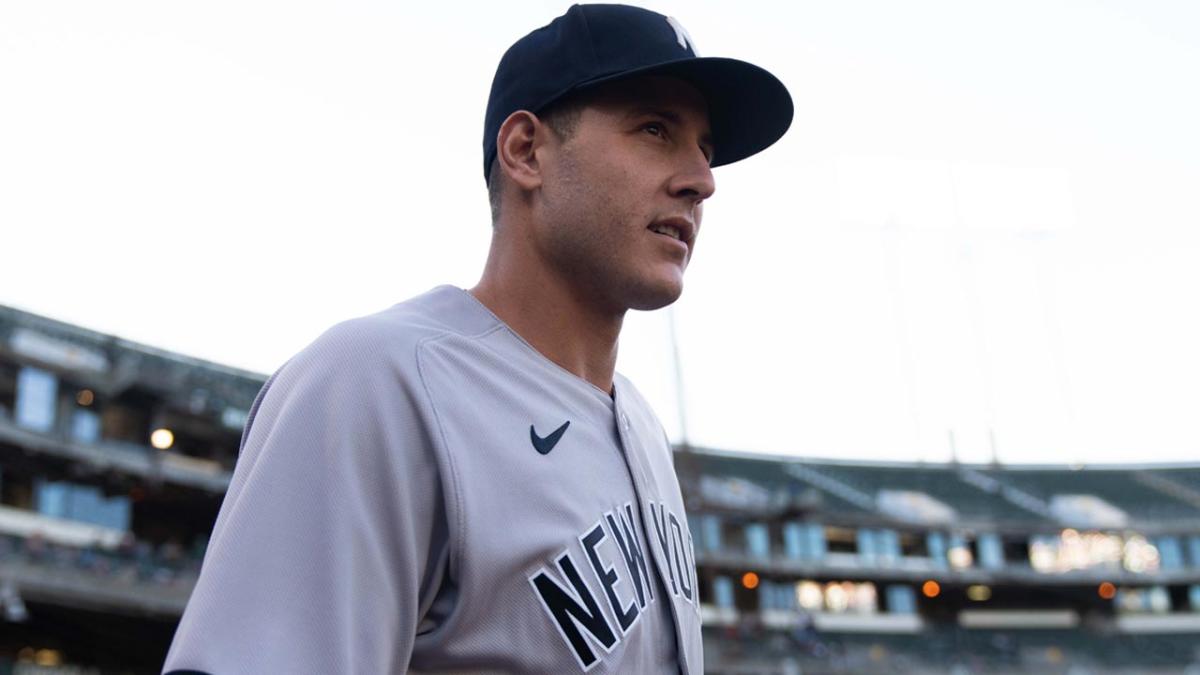
What if Cubs, Anthony Rizzo can go home again? originally appeared on NBC Sports Chicago
Jose Abreu to the Cubs to fill their first-base void until Matt Mervis or somebody else in the system is ready?
Not bad.
But what about a reunion with an old friend — specifically, the old friend whose departure created the void in the first place?
It might take three years. It might take a miracle. (it might be the same thing).
RELATED: Report: White Sox’ José Abreu on Cubs’ offseason wish list
But maybe Anthony Rizzo can go home again?
The former face of the Cubs franchise, who was last seen setting the first-inning tone for the Yankees’ Game 4 Division Series win over the Guardians Sunday, can opt out of his two-year, $32 million contract halfway into the deal, after this season.
And if the Yankees somehow let him get away without sweetening the deal enough to keep him, Rizzo figures to at least get more in free agency on another multiyear deal of two or three years.
And if you’re talking a couple years commitment, you’re talking the Cubs’ language.
And if you’re talking first base, “there’s a big hole for me at first base,” says the Cubs manager, David Ross.
And if you’re talking a right-handed slugging first baseman whose power numbers were down in 2021 — who will be 36 on Opening Day — compared to a lefty slugging first baseman coming off a 32-homer season (albeit, at short-right-field Yankee Stadium) with a better glove, who just turned 33?
If the contract length is similar, maybe it’s even worth a few more dollars per year.
Even if the Yankees make Rizzo the $19.65 million qualifying offer if he opts out — and if Rizzo doesn’t accept the quick and easy, 23 percent raise.
That’s a long list of ‘ifs.’
And Rizzo was pretty chapped in the spring of 2021 when the Cubs offered him an annual-value pay cut on five-year, $70-million extension offer — cutting off talks and later criticizing Jed Hoyer’s contention that the team’s failure to achieve extensions with core players such as Rizzo was the players’ faults.
RELATED: Cubs culture? Anthony Rizzo, Yankees know the difference
RELATED: Anthony Rizzo: ‘Cubs should be competing every single year’
“It sounds like a bad breakup and the person saying that they’re fine when they’re not fine,” Rizzo said during an interview last year on the Kap & J.Hood show on ESPN-1000.
“I know it comes down to a business and when you want your cake, and you want to eat it too; that’s kind of how it seemed,” he said. “I think it can all speak for itself that there’s a common denominator that no one signed.”
And for all of Hoyer’s talk last year about not closing the door on bringing back Rizzo, Kris Bryant or Javy Báez after trading all three at the deadline in 2021, the Cubs didn’t talk with any of them during their free agency (sources said from the time of the trades the team had no intention of bringing any of them back).
But as much as Rizzo has found comfort in his second baseball home in the Bronx, he also recalled a few months ago how “I expressed 100 different times how I wanted to be there for life.”
And Hoyer said just last week, “We absolutely want to compete next year.”
After stripping down the roster, the Cubs have payroll flexibility this winter like they’ve had precious few times over the past decade or so, and both Hoyer and chairman Tom Ricketts have vowed to be aggressive and spend.
So can they repair the bridge that was singed on Rizzo’s way out the door?
Will the Cubs be willing to offer more annual value on a shorter contract than they did with that spring 2021 offer?
And is Rizzo worth more?
Consider that the answer might be a strong ‘yes’ after extreme shifts are banned, starting next season.
Few hitters in the majors figure to benefit from that rule change than the lefty pull hitter, who has been right-side shifted more than 80 percent of his plate appearances and still put up a .338 on-base percentage this year (.366 career).
Does his batting average go up 15-20 points with the rules change alone? What’s that do to his OBP? What’s it do for the hitters around him in the lineup who, in turn, have more dangerous protection behind them or men on base more frequently ahead of them?
What’s that worth for a team that “absolutely” wants to compete?
And what’s it worth to Rizzo to come back?
“You just know it’s a business. They had to make tough decisions,” he said this summer. “As a human being, was I pissed off? Of course. But as a baseball player who sees what happens, this is a business. That’s the way it is.”
Click here to subscribe to the Cubs Talk Podcast for free.
Download
Download MyTeams Today!
